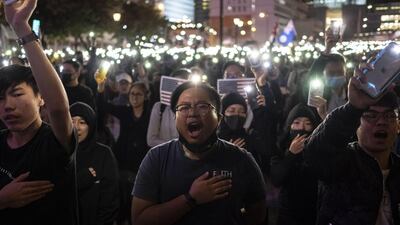Six months have passed since an estimated one million people marched through the centre of Hong Kong on June 9 to protest against a now-axed extradition bill. Today, the anti-government demonstrations are driven by a collection of new and old songs, including Glory to Hong Kong, an "unofficial national anthem" that didn't even exist four months ago.
A rousing military march composed by an anonymous musician, coupled with crowdsourced lyrics, the orchestral anthem went viral within hours of being posted on YouTube on August 31. By September 10, it was echoing across Hong Kong Stadium, from hundreds of people at a Fifa World Cup qualifier against Iran. The same night it was heard at more than a dozen malls across the city.
The most popular version was recorded by the masked Black Blorchestra. Dressed in protest gear, the performers' video got 3.7 million views. An English-language version is in circulation and numerous other translations and recordings have followed. It has also been performed live by Denise Ho, the Cantopop star who became an outspoken symbol of 2014's Umbrella Movement.
At public gatherings, Glory to Hong Kong quickly replaced the role played by English-language songs, most especially the hymn Sing Hallelujah to the Lord and Do You Hear the People Sing?, from Les Miserables. Ironic renditions of the British national anthem God Save the Queen have also been heard on numerous occasions.
In a digital age, protesters have displayed a collective sense of humour by repurposing songs into humorous chants. Most shared is a satirical remix of Sia's 2014 hit Chandelier, spliced with excerpts from a pro-
police speech by celebrity Macau singer and chef Maria Cordero, her words now cut, pasted and autotuned to flip their meaning. The resulting clip has been watched 2.7 million times.
"These songs play an important role in the movement," says K Cheung, 25, a professional who has attended more than 30 protests. "They give us a means to vent our dissatisfaction."
The melody from The Sound of Music's Do-Re-Mi has also been repurposed as the protest battle cry: "If we burn, you burn with us".
"Chants unify us and keep the tempo of the movement," says Cheung. "Especially when Glory to Hong Kong was created, the morale had gone down a bit in September, but when that song started to spread it really helped increase our sense of belonging."
Cantonese culture has been used to powerful effect, fostering a sense of togetherness through familiar songs such as Boundless Oceans, Vast Skies – a 1993 single by beloved rock band Beyond, best remembered as the anthem of 2014's Occupy protests.
No better example exists than "Godfather of Cantopop" Roman Tam's Below the Lion Rock, the theme from the TV series of the same name. Already an established anthem, the song's uplifting message of overcoming hardship served to unite protesters in their collective struggle. On November 1, the Hong Kong Philharmonic Orchestra performed the tune as a surprise encore at a commemorative programme titled Sounds of Hong Kong – prompting a joyous audience singalong in an ordinarily stuffy concert hall.
The same communal spirit that fuelled Glory to Hong Kong has been repeatedly evident in inventive crowdsourced content that serves to artfully frame Hong Kong's protests. Last month, an anonymous collective of musicians, producers and animators collaborated to write the polemic of Bauhinia Rhapsody, a biting, observational hip-hop track. Credited simply to "the Hong Kong people", an unidentified rapper describes, in English, disillusioned youths who follow "the rumble of a million feet" to find glory in the protest movement. It has attracted more than 280,000 views since being released on November 16.
Live music has also served as a powerful tool to unite communities. In late August, a multi-genre bill of 12 acts, from indie to hip-hop, played at the Summer Blossom Festival, a fund-raiser hosted at the centrally located Macpherson Stadium. Members of indie stalwarts Teenage Riot memorably appeared in the bright-yellow construction hats worn by protesters for protection and, as they opened their set with a stark a cappella cover of the idyllic jazz standard What a Wonderful World, it was hard not to interpret it as a plea of hope.
All-girl math-folk group GDJYB made a powerful statement at last month's government-supported Nordic & Hong Kong Band Sound Gala. They performed a dialogue-free set in symbolic face-masks in front of a huge video screen displaying clips of violent clashes between police and protesters. And the day of last month's district council elections was marked by a heavy metal mini-festival.
Hong Kong's fiery metal community has proved to be a hotbed of dissenting voices, with several underground artists inspired to release new music in direct support of the protests. Among them is Step Back to the Almond Blossom by Rokkasen, a local post-punk group.
Newest to arrive is the funk metal stomper Black Army, an unsubtle cry of support for the protest movement released by Dipen Gurung, the Hong Kong-born Nepali vocalist who is the frontman of long-standing rap metal outfit Intellectual Morons.
The lyrics to Human Betrayer's extreme metal attack Dark Age might be largely incomprehensible, but the terrifying music video, collecting some of the most violent clashes up to its late-August release is impossible to misunderstand.

